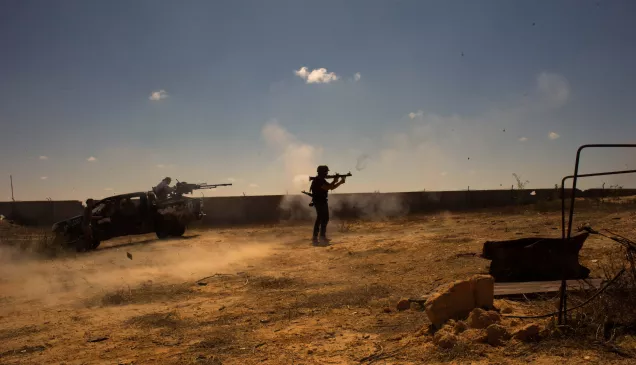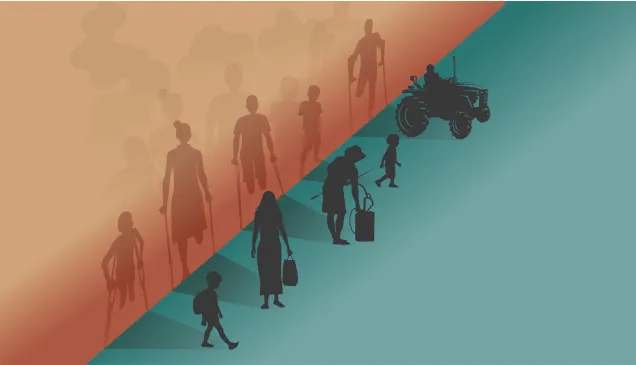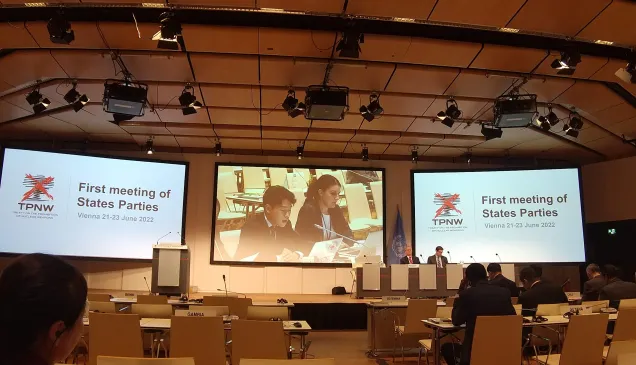Meeting of the States Parties to the Biological weapons convention - 2017
Meeting of the States Parties to the Convention on the Prohibition of the Development, Production and Stockpiling of Bacteriological (Biological) and Toxin Weapons and on their Destruction, 4–8 December 2017, Geneva. Statement by the ICRC
Efforts to prohibit biological weapons through the 1925 Geneva Protocol and the Biological Weapons Convention (BWC) have been very successful. The BWC enjoys near-universal membership, with 179 States party.
Today the prohibition of the use of biological weapons is a rule of customary international humanitarian law, binding on all parties to all armed conflicts, including non-State armed groups.
The International Committee of the Red Cross (ICRC) welcomes Samoa as the newest State party to the BWC and urges the 17 States that have not yet done so to ratify or accede to the treaty without delay. There can be no justification for remaining outside the BWC, and all States should be able to reap the benefits and protections that it affords. The ICRC also urges States still holding reservations to the Geneva Protocol to withdraw them, since the prohibition of the use of biological weapons applies in all circumstances.
Despite successes in universality and adherence, the BWC has faced challenges in adapting to changing circumstances and improving the level of implementation. This was made evident at last year’s Review Conference, where a consensus could not be reached on an intersessional work programme. Meanwhile, scientific and technological developments continue apace, and opportunities to enhance the world’s safeguards against poisoning and the deliberate spread of disease are being missed.
This meeting provides another chance to make progress on issues of substance and to put in place an effective work programme for 2018 and onwards that reflects the importance of protecting humanity from the horrific effects of biological weapons.
These efforts can build on other recent discussions. For example, the ICRC was pleased to take part in the conference “Global Biosecurity Challenges: Problems and Solutions” organized by the Russian Federation and held in Sochi in November 2017. It also welcomed the joint statement issued by Russia, the United Kingdom and the United States recognizing the importance of reinforcing the BWC and of agreeing a work programme for 2018.
Several areas of future work were proposed in the joint statement and in the many working papers submitted by States Parties for the 2016 Review Conference and for this meeting of States Parties. From the ICRC’s perspective, there are four key areas of work needed to strengthen the BWC’s prohibitions.
First, the States Parties should explore the full range of ideas on, and approaches to, compliance monitoring, including consideration of verification measures, with a view to developing effective means of monitoring and assessing compliance with the BWC.
Second, States Parties must be prepared to respond and assist each other in the event biological weapons are used, including through enhanced capacities to assist victims. Therefore, another area of focus should be on operationalizing Article VII, with work aimed at building up response capacity where it is lacking, improving coordination among those responding, and addressing obstacles to providing an effective response.
The ICRC submitted a working paper to the 2016 Preparatory Committee (Working Paper 39) highlighting the challenges made evident in the international humanitarian response to the 2014–2016 Ebola outbreak. It also identified lessons learned from this natural outbreak that could be used to improve the response in the event of a deliberate attack.
In this context, other recent efforts to discuss the challenges and requirements for international coordination in responding to the deliberate release of biological agents have been useful. These include a meeting at Wilton Park in the United Kingdom in September and an inter-agency table-top exercise run by the BWC Implementation Support Unit in Geneva in October. The ICRC also encourages States to improve and adapt national response mechanisms that would enhance protections against both natural and deliberate outbreaks of disease.
Third, there is a need for an effective mechanism in the BWC for assessing the implications of developments in science and technology. The mechanism should allow States Parties to keep pace with developments that may introduce new risks with regard to the hostile use of biotechnology, while at the same time ensuring that peaceful biological research can proceed unhindered.
Fourth, the ICRC reiterates the need to sustain efforts aimed at ensuring effective domestic implementation of the BWC. Legally, as well as for public-health and security reasons, States Parties must ensure that their domestic laws account for their international obligations, and that appropriate biosafety, biosecurity, export-control and enforcement measures are in place. The ICRC previously developed model implementing legislation with the Verification Research, Training and Information Centre (VERTIC) and can assist States in this matter.
We have seen the devastating effects that naturally occurring infectious disease pandemics have had on public health, economic well-being, and national and international security, as well as the challenge of putting together an efficient and coordinated humanitarian response. This should be enough to convince the States Parties to take their individual and collective responsibilities seriously in preventing the deliberate – or accidental – spread of disease.
The ICRC urges the States Parties to seize the opportunity provided by this meeting and agree a work programme that reflects a comprehensive effort to ensure that the life processes at the core of human existence are never manipulated for hostile purposes.



